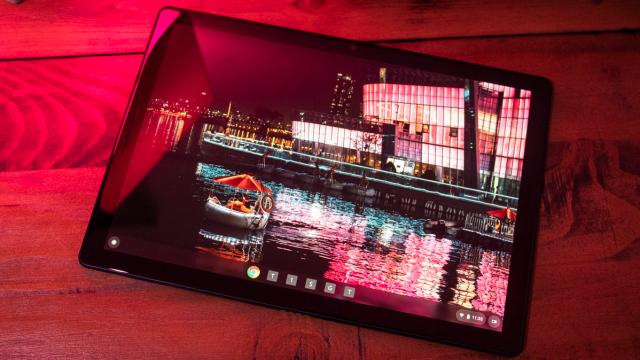Google isn’t killing all tablets, but it will no longer be making its own tablets. It’s a crying shame as Google’s merging of Android and Chrome OS for last years abysmally reviewed Pixel Slate was perhaps the perfect tablet OS.
Google hasn’t publically announced any tablets since the Slate, but according to Computerworld it had at least two devices in development. That changed when, earlier this week, Google wiped tablets off its roadmap and resolved to focus on laptops for all future Chrome OS devices.
Rick Osterloh, who heads devices at Google confirmed it on Twitter.
Hey, it’s true…Google’s HARDWARE team will be solely focused on building laptops moving forward, but make no mistake, Android & Chrome OS teams are 100% committed for the long-run on working with our partners on tablets for all segments of the market (consumer, enterprise, edu)
— Rick Osterloh (@rosterloh) June 20, 2019
In a statement to Gizmodo, a Google rep also confirmed it saying, “Chrome OS has grown in popularity across a broad range of form factors and we’ll continue to work with our ecosystem of partners on laptops and tablets. For Google’s first-party hardware efforts, we’ll be focusing on Chrome OS laptops and will continue to support Pixel Slate.”
In the interim let’s all moan and groan because dang it Google had the potential to craft something really tremendous.
In 2015 Google launched the Pixel C tablet, a gorgeous piece of hardware hampered by an operating system that failed to smoothly move between tablet and laptop mode. It seemed like it had nearly nailed the tablet, and with a little effort could perfect it.
Then it made the Pixelbook, which continues to be the highwater mark for Chromebooks nearly two years after launch and despite a high price and older hardware. It also happened to be one of the best 2-in-1 laptops around. It seemed a no brainer that if Google combined the lessons learned from the Pixelbook and Pixel C it could make a tablet that would rival both the iPad and the Surface, and perhaps far surpass them.
Last year it launched the Pixel Slate which should have been that device. I had issues with the slick glass surface and the weird keyboard, but I loved the operating system, which nearly perfectly blended Chrome OS and Android OS, allowing you to use the tablet like a perfectly lovely little Chromebook when the keyboard was attached, and then convert in a fine media consumption tablet when it was detached.
Unfortunately, my experience was the exception, and many other reviewers found the OS buggy—particularly when moving from keyboard to touch-focused input and back again. Things started to look even worse when rumours abounded in March that Google was reorganising its hardware division.
While neither Osterloh or Google is saying why it’s decided to stop making its own tablets one could look to the Pixel Slate’s lukewarm reception as a reason. Particularly as the more traditional Pixelbook is held in such high regard.
When you consider Google has made one of the best Chrome OS device and one of the worst reviewed high-profile ones it’s easy to get why it’s focusing on laptops.
Something Computerworld stressed, and that was reiterated to me by Google, is that the company isn’t out of the Chrome OS or Android hardware business. Phones and laptops will still be made.
Laptops with touch screens and 360-degree hinges are still on the table. But pure tablets, that can convert to a laptop with an additional keyboard case, are now firmly done.
This is fine news if you’re eager for a new Google-made Chromebook, but if you were hoping that the company was finally, really, going to nail the tablet you’re out of luck.
